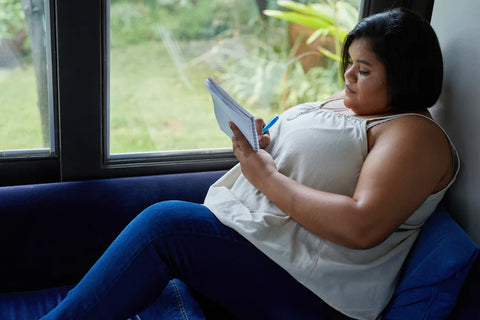Can Mindfulness Help With Anxiety?
Mindfulness can help anxiety as it is all about being in the present moment rather than thinking about our troublesome thoughts. We are often in the moment when we are doing something we enjoy, so we can all do it.
7 minute read
Key points
- The only moment we have is the moment we are in right now.
- With a regular practice, anxiety and depression are reduced and memory and mental clarity increase
- We are able to observe our thoughts as they come and go, and gradually let go of struggling with them when we notice that we are not our thoughts.
It sounds so simple, but when we first try to intentionally quieten our minds, we soon become aware of all the usual chatter that goes on in our heads. In the beginning, it can seem impossible to get rid of those thoughts for more than a second or two.
Our mind goes into overdrive, and we focus on these thoughts about something that has happened in our past, or something in our future that hasn’t yet happened, and we can think we are failing at mindfulness. This is the time to be kind to ourselves, to know we are doing the best we can.

The Goal is to Observe Without Judgement
The goal is not necessarily to get rid of all thoughts, but to observe what is going on without judgement. To notice the thoughts and show compassion and kindness to yourself.
Sometimes, we can be put off meditations and mindfulness because we believe it is too tricky, but it doesn’t need to be that way, and the benefits of quieting our minds are huge.
It just takes a bit of practice, and it is well worth continuing.

What Does It Mean to be Mindful?
The only moment we have is the moment we are in right now. The past has already happened, and our future is not yet upon us. Therefore, to enjoy this moment we need to fully show up right now. To enjoy this moment, we can’t change the past or predict our future.
I know from my own experience, that if I think I am too busy to practice being mindful, that is actually when I need to do it most. It is when I am stressed and anxious and require the calm of being mindful to cope with whatever life is throwing my way.
Mindfulness is a Practice
Mindfulness is a practice and a way of living, and we can embrace it in every moment of our lives. It is thousands of years old and has been scientifically shown to influence our health, relationships, wellbeing and happiness.
I can not promise you that your life will be perfect in every way when you practice mindfulness, but I can promise you will have moments of calm and you will get an alternate way to feel about the relentless struggles that we can sometime face.

What Are The Benefits Of Being Mindful?
Mindfulness has been proven to prevent excessive feelings of anxiety and depression as the initial feeling of stress or sadness is redirected from spiralling out of control.
Overtime, and with practice, we are able to notice changes in our moods, our happiness and wellbeing. Studies have shown that practicing mindfulness positively affects our brain patterns so when stress and anxiety arise, they disappear again more easily.
Many studies indicate that meditation enables us to be happier and more content, and these positive emotions are linked to improved wellbeing and a longer and healthier life.
With a regular practice, anxiety and depression are reduced and memory and mental clarity increase. Relationships become more fulfilling and even our immune system gets a boost.

How Can We Practice Mindfulness?
We can be seated, standing or lying down when we choose to be mindful. We can practice being mindful while doing the dishes or taking a shower. It is all about feeling the sensations in that moment, so focus on the temperature of the water, and how it feels on your skin. What can you see in that moment, and what can you hear? What can you smell, touch or taste? Be aware of your breath as it goes in and out and notice how your tummy rises and falls.
By focusing on our breath, we are able to observe our thoughts as they come and go, and gradually let go of struggling with them when we notice that we are not our thoughts. All thoughts, positive and negative, come and go, they are just passing through and it is our own decision how we act on them.
Below are some examples of how we can take back control of our lives, moment by moment.
1 Minute Mindful Meditation
- Sit upright in a chair with your feet flat on the floor. If possible, bring your back away from the chair so your spine is self supporting you. Close your eyes or lower your gaze.
- Focus your attention on your breathing. There is no need to change the way you are breathing, just notice the sensations of your in breath and out breath. There is no need to look for anything special to happen, you are just observing.
- If your mind wanders, gently bring your attention back to your breath. Its not a problem and is totally natural when our minds wander. The fact that you noticed your mind wandering and brought your attention back to your breath without judging yourself is at the centre of mindfulness.
- Your mind may eventually become calm, or it may not. Both are OK. Notice how you are feeling, as you may feel a fleeting feeling of stillness, or you may feel something else. Just allow that feeling to be as it is.
- After 1 minute, open your eyes and continue with your day.

Chocolate Mindful Meditation
- Choose a type of chocolate that is different from your usual choice, either that you have never tried before or you have not eaten recently.
- Open the packet and smell it. Take in the full aroma of the chocolate.
- Break off a piece and really look at it. What can you notice? Really examine every shade, is it shiny or matt? Notice how it broke from the rest of the chocolate bar, was it a clean break or jagged?
- Pop it in your mouth without eating it! Let it sit on your tongue as it begins to melt. Notice the temptation to suck or bite it. What can you notice about the flavour? If your mind wanders, just bring it back to the sensation of the chocolate melting
- After the chocolate has completely melted, swallow it slowly. Notice the sensation of it trickling down your throat. Repeat with another piece.
- Notice how you feel. Did the chocolate taste more intense when you slowed down? Imagine how our relationship with food and meal times would be if we were mindful with every meal?

5-4-3-2-1 Mindfulness
- Wherever you are right now, notice 5 things around you that you can see. One at a time, just notice them. Observe the shapes and colours, how the light falls on that object. Once you have noticed everything to notice about that object, choose another.
- When you have fully noticed everything there is to see with these 5 objects, pay attention to what you can touch. Observe 4 things you can touch in this moment. Is it the chair beneath you, can you notice how that feels. Perhaps you can touch your phone, or the device you are reading this from. How does it feel to run your hands over it, is there any warmth in the device, or does it feel cold? How does the texture of your top feel? Can you touch a houseplant maybe, notice how the leaves feel.
- When you have fully noticed 4 things you can touch, pay attention to what you can hear. Maybe you can hear the fan on your laptop, maybe you can hear the birds singing, or cars passing by. Maybe you can just hear silence. Focus on that silence and see how it changes. Perhaps you notice the creak of the chair you are sitting on, or you can hear your heartbeat. When you have identified 3 sounds, move onto smell.
- Maybe you initially struggle to smell anything, but can you smell the lingering scent of hand wash, or the comforting smell of home or nature. How can you describe that smell?
- Lastly, focus on taste. Can you subtly recognise the taste of toothpaste or the last thing you have eaten or drunk?
- Notice how you now feel, you should be feeling calmer. You can repeat this as many times as you wish.
Walking Mindfully
Walking in nature is a great stress reliever and mood booster. Even a 10 minute walk around the block where we live can put our thoughts into perspective.
- Be mindful of how your body is moving when you walk. When we feel anxious or sad, we are more likely to walk slowly, hunch our shoulders and look down. We tend to swing our bodies from side to side instead of up and down. If you are feeling down, roll your shoulders back, walk upright and swing your arms. Keep your gaze straight ahead. Notice how this feels so much better.
- As you take a walk, notice the feeling of your feet as they land on the ground. Does your foot land toe first or heel first? Notice how different it feels if you tread on a stone or if the pavement is uneven, how does the pavement feel different to walking on grass? Notice how your whole body is moving, not just your legs.
- Pay attention to all the sights, sounds and smells you experience. Take time to smell flowers and notice the smells associated with the season. Maybe you can smell exhaust fumes, or the smell of food wafting out of an open window.
- Can you feel a cold breeze or the sun on your face? How do your feet feel in your shoes?
- Look up and notice the architecture if you are in a city or notice the birds in the trees. Notice the different shade of green you can see in the leaves. How is your view changing as you continue with your walk.
- Notice how you are feeling?

Congratulations!
One of the hardest things about living in our crazy busy world is that we often don’t congratulate ourselves for the tasks we actually complete. We tend to focus more on what is left to do, and rush from one task to the next.
So I invite you to note what you do manage to complete each day, whether it is being mindful, getting the kids to school, cooking the dinner, helping with homework, helping a friend, tidying the kitchen, walking the dog …. What ever it is, be grateful that you have done this today.
Other Resources You May Be Interested In:
What Are The Different Types of Anxiety?
Circle of Control and Influence
If anxiety is something you or your loved ones struggle with regularly, then please get in touch to discuss how I can help you overcome the underlying cause of anxiety.


